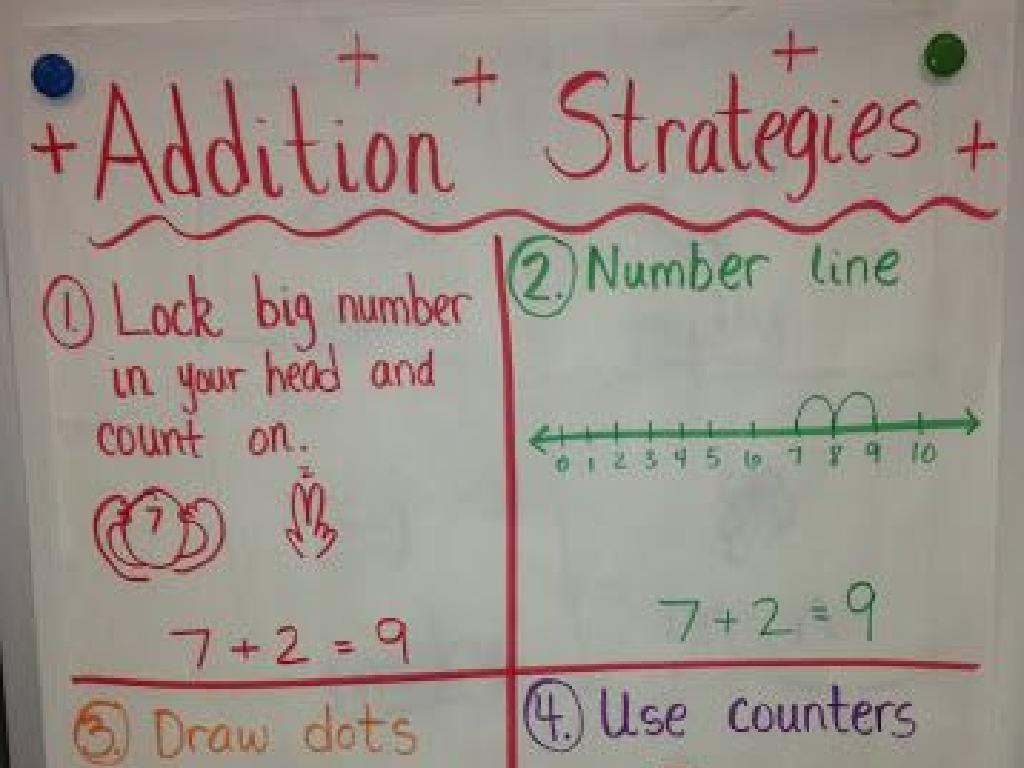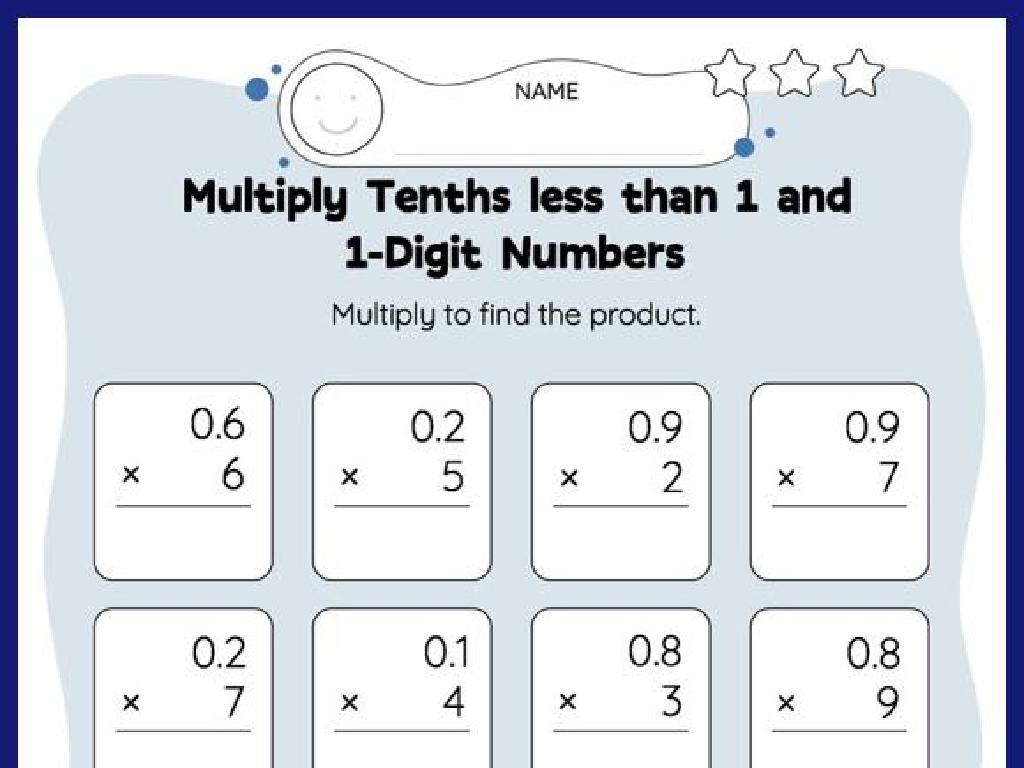Capitalizing Days, Months, And Holidays
Subject: Language arts
Grade: Third grade
Topic: Capitalization
Please LOG IN to download the presentation. Access is available to registered users only.
View More Content
Capitalizing Days, Months, and Holidays
– Capital letters start days and months
– For example: Monday, Tuesday, January, February
– Holidays also begin with capital letters
– For example: Thanksgiving, New Year’s Day
– Capital letters show importance
– Quick recap: What is capitalization?
– Capitalization is using a big letter at the start
|
This slide introduces the concept of capitalization with a focus on days, months, and holidays, which are always capitalized in English. Emphasize to students that capital letters are used to show that these words are important and have a special meaning. Provide examples for each category to ensure understanding. A quick review of capitalization can include its use for the first word in a sentence, names, and places. Engage the class with a discussion on why they think these words deserve capital letters and ask for more examples from the class. This will help reinforce the rule and the importance of proper nouns.
Capital Letters: Days, Months, and Holidays
– What are capital letters?
– Big letters like A, B, C, used in specific cases
– When do we use capital letters?
– Start sentences and for proper nouns like names
– Capital letters mark beginnings
– They signal the start of new sentences or ideas
– Capital letters for ‘special’ words
– Days, months, holidays, and people’s names
|
This slide introduces the concept of capital letters to third-grade students, explaining their significance and when they are used. Capital letters are the larger forms of letters and are used at the beginning of sentences to signal the start of a new thought. They are also used for ‘special’ words, which include proper nouns such as the names of people, places, and specific things like days of the week, months of the year, and holidays. It’s important to emphasize that not all words are capitalized, and capital letters help us recognize important words that need to stand out in writing. Encourage students to practice identifying and using capital letters by writing sentences and pointing out the capitalized words.
Capitalizing Days of the Week
– Seven days in a week
– Remember, there are always 7 days!
– Capitalize each day’s name
– Always start with a big letter like ‘M’ in Monday
– Example: Monday, Tuesday
– Days like ‘Wednesday’ start with ‘W’
|
This slide introduces the concept of capitalization with a focus on the days of the week. Emphasize to the students that there are seven days in every week and each of these days’ names should always begin with a capital letter. Provide examples of the days of the week, such as Monday, Tuesday, and Wednesday, ensuring to capitalize the first letter of each day. Reinforce this concept by having students practice writing the days of the week on their own, both in and out of order, to ensure they understand the rule of capitalization applies regardless of where the word is placed in a sentence.
Capitalizing Months of the Year
– 12 months in every year
– Remember, a year has 12 months
– Each month starts with a capital
– Just like names, months are special and start big!
– Example: January, February, March
– January is the first month, then February, then March, and so on…
|
This slide introduces the concept of capitalization as it applies to the months of the year. Emphasize to students that there are 12 unique months, and each one is important and deserves to start with a capital letter, just like their own names. Provide examples of the first few months to illustrate this point. Encourage students to practice writing the months with capital letters and to always check their writing for proper capitalization. You can extend the activity by having students write out all 12 months in order, ensuring each starts with a capital letter, as a classroom activity or for homework.
Capitalizing Holidays
– Holidays are special celebration days
– Always capitalize holiday names
– Example: Thanksgiving, Christmas
– Important holidays like New Year’s Day, Easter
– Practice: Write down three holidays
– Think of your favorite holidays and capitalize!
|
This slide introduces the concept of capitalizing the names of holidays, which is a part of proper noun capitalization rules. Emphasize to students that holidays are treated as special and unique events, hence their names always start with a capital letter. Provide clear examples such as Thanksgiving, Christmas, and Fourth of July. Encourage students to practice by writing down the names of three holidays they know, ensuring they start each with a capital letter. This exercise will help reinforce the rule and allow students to apply it immediately. In the next class, review the examples students wrote as a way to check their understanding and correct any mistakes.
Practice Time: Capitalizing Days, Months, and Holidays
– Correcting sentences together
– Writing sentences with capitalization
– We’ll write our own sentences using today’s date and upcoming holidays.
– Days, months, and holidays use capitals
– Remember, names like ‘Tuesday’, ‘January’, ‘Thanksgiving’ always start with a big letter.
– Let’s practice and learn!
|
This slide is for an interactive class activity focused on capitalization. Start by showing examples of sentences that incorrectly use lowercase for days, months, and holidays. Work with the class to correct these sentences. Then, have students write their own sentences, ensuring they capitalize the appropriate words. This could include writing about events happening on specific days, describing activities they do in certain months, or expressing excitement for upcoming holidays. Encourage creativity and provide guidance as needed. This activity will reinforce the rule that days of the week, months of the year, and holiday names always begin with capital letters. It’s a fun way for students to practice their new skills and demonstrate their understanding.
Let’s Play Capitalization Bingo!
– Play Capitalization Bingo
– Find words to capitalize
– Look for days, months, and holidays
– Work with a buddy
– Pair up and help each other
– Complete your Bingo card
– First to fill their card wins!
|
This slide introduces a fun classroom activity to reinforce the lesson on capitalizing days, months, and holidays. Capitalization Bingo is a game where students work in pairs to identify words that require capitalization on their Bingo cards. Provide each pair with a Bingo card that has various words, including days, months, and holidays, as well as common nouns that should not be capitalized. As you call out the words, students will mark them if they are on their card. The first pair to complete a row or column wins. This activity encourages collaboration and helps students practice identifying proper nouns that require capitalization in a fun and interactive way. Make sure to walk around the classroom to assist pairs as needed and to ensure they understand why certain words are capitalized.
Class Activity: Create Your Own Calendar
– Make your personal calendar
– Capitalize birthdays, holidays, school days
– Remember, names of specific days and months start with capital letters
– Decorate your calendar with colors
– Present your calendar to the class
– Explain why certain dates are important to you
|
This activity is designed to reinforce the concept of capitalization of days, months, and holidays. Provide each student with a blank calendar template. Guide them to mark and correctly capitalize important dates such as their own birthdays, national holidays, and special school events. Encourage creativity by allowing them to decorate their calendars. This will make the learning process enjoyable and memorable. Once completed, each student will share their calendar with the class, explaining the significance of the dates they’ve marked. This will not only help them practice speaking skills but also allow them to understand the importance of capitalization in written English. Possible variations of the activity could include pairing students to compare calendars, creating a classroom calendar with input from all students, or even a digital calendar creation if resources allow.
Capitalization Wrap-Up: Days, Months, and Holidays
– Congratulations on learning capitalization!
– Always capitalize days, months, and holidays
– For example: Monday, January, Thanksgiving
– Practice makes perfect
– Keep using capital letters correctly!
– Start sentences with capital letters and use them for names too
|
This slide is a conclusion to reinforce the capitalization rules that the students have learned. It’s a celebration of their effort and a reminder to consistently apply the rules in their writing. Emphasize the importance of capitalizing days of the week, months of the year, and holidays, as these are proper nouns. Encourage regular practice, as this will help them remember to use capital letters correctly. Provide examples and remind them that capitalization is not just for these categories but also for starting sentences and for names of people and places. You can plan a few activities for the next class where students can practice writing sentences with proper capitalization.






